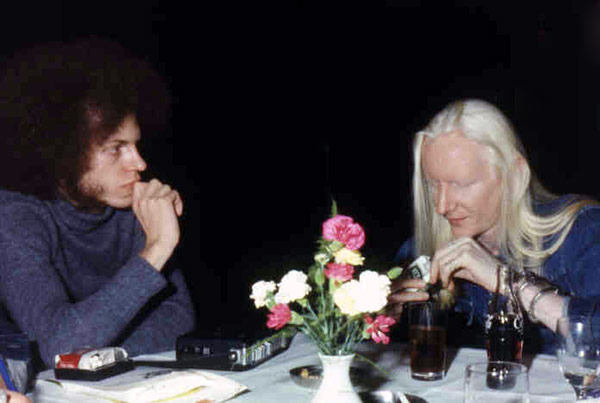Johnny Winter went on the road from March 11 to April 8, and then he has three concerts on May 30, 31, and June 1. The road crew also works for his brother, Edgar Winter; the two take turns traveling.
This is just one difference from past days when Johnny Winter stayed on the road all the time. One reason was to keep working and to keep the same road crew together. Another was to live up to having been the unknown artist to receive the biggest advance in music business history from a record company, in 1969 — to become the success expected from that and to remain that success.
At the same time, personal problems piled up, as did loneliness, and the whole thing became a nightmare, made worse by drugs.
"I've been out of the hospital nearly two years," Winter says. "It'll be two years in May. I was in for nine months, in New Orleans.
"I was using heroin. My personal problems were so bad. I thought I was using drugs until I could get off the road. I wanted to finish the tour really badly. I was really miserable. When the tour was over, I was completely psychologically addicted.
"I couldn't get to sleep or rest. Horrible loneliness was the main thing. Being any kind of star, you cut yourself off from people. I was determined I wasn't going to change. You can't help it. People don't relate to you in the same way. Even people who love you can't relate to you; there's an extra barrier, a wall, there. If you're around people for a while, you can transcend that, but we kept traveling.
"You get on a horribly superficial level. Pretty soon you feel like everybody else is living and seeing each other and talking. You never communicate. It's all a big sea of motels, groupies, airports, and halls. Everybody looked exactly the same, and I knew what they wanted. I was really lonesome. I didn't feel I had a home life or friends.
"I got to be miserable. It was like the only thing that mattered in the music business was how good you did on the last tour and how many records sold. Life became unimportant. I can laugh about it now, only because I've sorted it all out. It was a nightmare when it happened. My values have completely changed. I realized the business end of it, being successful, wasn't that important. I still want to do it. It's something I love. But now I've got to have my private life and plenty of it. Never for anything would I go back to being on the road all the time.
"The band is kind of like a family, but I'm staying away from the rest of it: the groupies, drugs, and party scene. The place where I was didn't let you sit in a corner and feel sorry for yourself. I could have cared less about eating and taking a bath. They'd tell you you're really a mess and that you messed up your whole life; they'd almost force you to react violently. I felt superior. I was sure they couldn't understand the music. But I got some help out of it.
The albums out since Columbia signed Winter to a $600,000 deal in five years are
Johnny Winter
,
Second Winter,
Johnny Winter And
,
Johnny Winter AND Live
,
Still Alive and Well
, and
Saints and Sinners
, the latter at No. 32 and climbing on the best-selling chart."
Source & Full Article: 74-04-15 Hagerstown, MD.pdf
